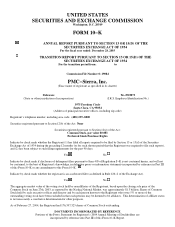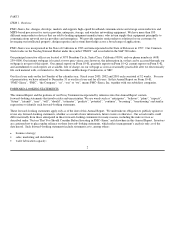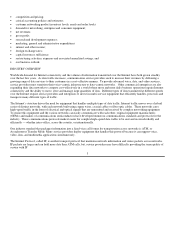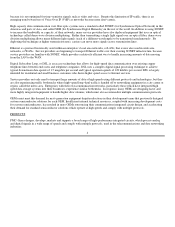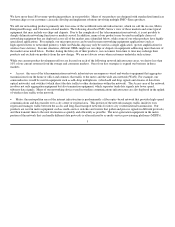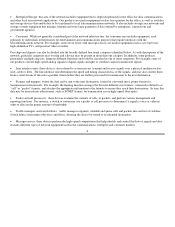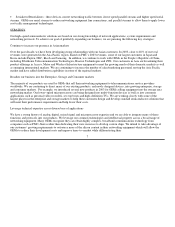Adaptec 2003 Annual Report Download - page 13
Download and view the complete annual report
Please find page 13 of the 2003 Adaptec annual report below. You can navigate through the pages in the report by either clicking on the pages listed below, or by using the keyword search tool below to find specific information within the annual report.
recognized through this distributor are on a sell−through basis, or once Memec ships our products to an end customer. In 2003, total
sales shipped through the Memec Group were $53.4 million, or 21% of total revenues (2002 − 24%, 2001 − 33%). Our second largest
distributor is Macnica. Sales shipped through this distributor in 2003 were 11% of total revenues and less than 10% of total revenues
in 2002 and 2001. Many of our customers are seeking to reduce supply chain costs and are requesting that we ship more of our
products directly to the contract manufacturers they have selected.
Our sales outside of the United States, based on customer billing location, accounted for 52% of total revenue in 2003, 45% in 2002,
and 42% in 2001. Our sales to Asia, including China, continued to increase in 2003 (38% of sales) from 2002 (27% of sales), as more
of our OEM customers use Asia based contract manufacturers for the assembly of their products.
Cisco Systems and Hewlett−Packard each represented more than 10% of our 2003 revenues based on total sales to end customers
through distributors, contract manufacturers or direct sales.
MANUFACTURING
We are a fabless company, meaning we do not own or operate foundries for the production of silicon wafers from which our products
are made. Instead, we use independent foundries and chip assemblers for the manufacture of our products. We believe our fabless
approach to manufacturing provides us with the benefit of superior manufacturing capability, as well as flexibility to move wafer
manufacture, assembly and test of our products to the vendors that offer the best technology and service, at an attractive price.
Typically, the complete manufacture of our chips requires 12 to 16 weeks, which we refer to as our lead−time. Based on this
lead−time, our team of production planners will initiate purchase orders with our suppliers for wafers and for the assembly and test of
our parts so that our products are available at a mutually agreed upon delivery time.
Wafer Fabrication
We manufacture our products using standard CMOS process techniques. We receive substantially all of the silicon wafers from which
we derive our products from Chartered Semiconductor Manufacturing Ltd. (“Chartered”), Taiwan Semiconductor Manufacturing
Corporation (“TSMC”), and IBM. These independent foundries produce our networking products at feature sizes down to 0.13
micron. By using independent foundries to fabricate our wafers, we are better able to concentrate our resources on designing,
development and testing of new products. In addition, we avoid much of the fixed capital and operating costs associated with owning
and operating fabrication or chip assembly facilities.
We have supply agreements with both Chartered and TSMC that we renewed during 2003. These renewed agreements are in effect
until December 31, 2004. As a result of these renewals, the deposits we have made to secure access to wafer fabrication capacity
decreased to $6.8 million under both of these agreements, from $22 million at December 31, 2002. Under these agreements, the
foundries must supply certain quantities of wafers per year. Neither of these agreements have minimum unit volume requirements but
we are obliged under one of the
9



